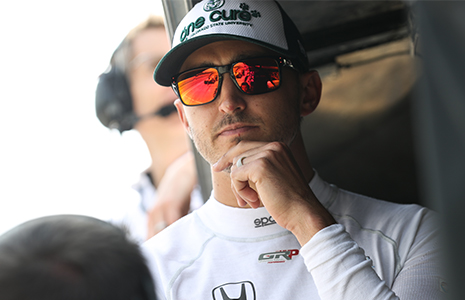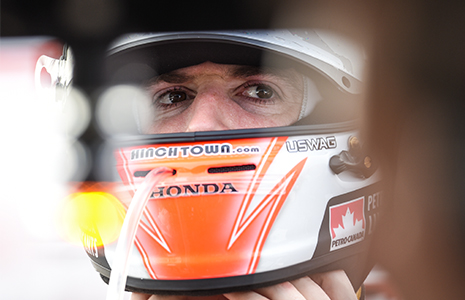When you put your car second on the grid and know you have a good shot at a win, having a mechanical issue ruin your chances can be a punch to the gut.
That’s exactly what happened to Graham Rahal in the Honda Indy Grand Prix of Alabama presented by AmFirst on April 7, but the Rahal Letterman Lanigan Racing driver has no time for sadness. He must now regroup quickly, clear his head and be ready to do it all over again this weekend in the Acura Grand Prix of Long Beach.
“It's hard to swallow and just think, 'Oh, don't worry about it,' because we know this championship is built on every single weekend. You can't really slip and be a champion,” said Rahal, who’ll drive the No. 15 TOTAL Honda on the streets of Long Beach, California.
“It takes a lot of mental strength to be good in this industry and live in this world. It's pretty easy to get down and out and pretty easy to give up.”
 Rahal's need to shake off his Alabama blues underlines why being psychologically prepared for whatever the NTT IndyCar Series throws at you cannot be underestimated.
Rahal's need to shake off his Alabama blues underlines why being psychologically prepared for whatever the NTT IndyCar Series throws at you cannot be underestimated.
James Hinchcliffe took that part of the game so seriously that the No. 5 Arrow Schmidt Peterson Honda driver worked with a mental coach earlier in his career to develop effective strategies to cope with the bad days.
“My whole philosophy that I live by is that you can't change what you can't change, so there's no point in really worrying about it,” Hinchcliffe said.
“I'm always trying to think about what's happening now or what will happen in the future, and I'm really good at letting the past go and that's bled out into my personal life and business outside of racing.”
Learning how to deal with disappointment was a common race-weekend task for Hinchcliffe's Arrow SPM teammate, Marcus Ericsson, during his five seasons in Formula One before he joined the NTT IndyCar Series this year.
“I had a lot of practice racing in F1 with teams at the back of the grid,” Ericsson said with a smile. “One of the main things is trying to keep positive, because if you start being negative and complaining about things and feeling sorry for yourself, it's just a downhill spiral that is not going to get you anywhere. Even if I have a bad weekend, I try to find the positives and take energy from that and then analyze the negative and then kick on. I think that's very important.”
When he needs to clear his head, Rahal usually goes home and spend quiet time with wife Courtney Force and dog Arrow. When he really needs to relax, he can often be found taking in a round of golf.
“I'm not going to lie, for me, golf is a great way to get away,” Rahal said. “Everybody's got their thing. For some people, it's going on a long run, and for me, golf is a way I can just go out with a buddy and press reset and life is good.”
Interestingly, while recovering from the practice accident at the Indianapolis Motor Speedway in 2015 that kept Hinchcliffe out of the car for the rest of the season certainly posed a challenge, his determination to get back into the car meant it wasn't hard to deal with mentally. What really put Hinchcliffe's mind to the test was the team mistake that resulted in him failing to qualify for the 2018 Indianapolis 500.
 “Dealing with what we did at the 500 last year was a bigger mental challenge than coming back from an accident,” Hinchcliffe said.
“Dealing with what we did at the 500 last year was a bigger mental challenge than coming back from an accident,” Hinchcliffe said.
“It was very tough to watch the green flag fly from the pit lane. I didn't make it long before I had to go retreat to the bus and sit in isolation in the dark. I think you learn a lot about yourself, your team and your partners in moments like that.”
Although tough times can test a driver's resilience, success can also become a dangerous mental pitfall.
“It is just as important to let the good days go because, going into the next race, a win means nothing,” said Hinchcliffe.
“You have to enjoy it in the moment because wins are so hard to come by in this series and you never know when your last one is going to be, but the next morning you have to start focusing on the next race.”
While mental coaches and golf can help, sometimes keeping your head in the game is simply a factor of knowing the ropes and using experience as a coping mechanism.
“You also get tougher as you get older and you know what you need to deal with disappointment because you've been through the ebbs and flows,” Rahal said. “But it still doesn't make it fun.”